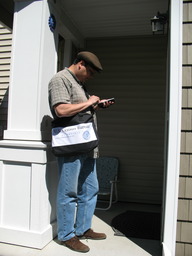 Seattle, USA
Seattle, USA
The woman who answered the door spoke haltingly. "Very sorry. I speak. Only Chinese. Very sorry."
"Oh, no problem," I countered. "I can speak a little Chinese," I flipped into Mandarin for the standard spiel: "Hello. I am here today representing the U.S. Census Bureau. We would like to ask you..."
I wasn't surprised to encounter somebody with language difficulty: I've spent the past couple weeks knocking on doors, working as part of an address canvassing operation for the U.S. Census Bureau. Many people living in the district I'm assigned to are recent immigrants--I'd already encountered a few people I couldn't communicate with at all. What did surprise me was how the woman immediately switched back into English to answer my questions, speaking with only a slight accent.
As soon as our conversation was finished, an Asian man with a huge grin came up behind her from inside their house. He addressed me in flawless English:
"Oh... that is great! We always have her answer the door to get rid of people by pretending that she can speak in Chinese only. We've never had somebody come to our door who was able to carry the conversation on. That is so funny!"
I agreed. This walking around Seattle, knocking on doors for the Census... it's been both funny and a lot of fun.
I've enjoyed seeing the deeper core of so many parts of town that I thought I knew. For example, I'm sure that I've previously passed through the industrial area south of downtown thousands of times. On occasion, I've even had reason to stop off somewhere en route. But, this job has made me realize how closely I've always kept to the arterials. I've been up and down 4th Avenue South countless times--but what lies one block over on 3rd Ave South? What's over on 2nd?
More interesting than seeing parallel streets in the industrial district has been going door-to-door through the neighborhoods. I thought I knew Beacon Hill. I thought I knew New Holly Park. Nope. There is a lot more variation within those blocks than I'd imagined. And even though most of the conversations are brief, I've enjoyed interacting, chatting with so many people in those areas.
I've found that lower Beacon Hill is positively rural. Just the other side of the tracks from where I'm now housesitting (I moved to the home of one of Greg's neighbors, today) people keep chickens. The roads are rough and lack sidewalks. Large, impassable areas of brush and brambles make navigating from one block to another a trial--even with the aid of a handheld computer replete with maps, addresses, and GPS. So much of Beacon Hill is a jumble. Some blocks have decrepit, abandoned structures barely standing side-by-side some swank place with fountains flowing out front.
One unexpected thing I've noticed adorning those nicer homes: many use stone heads of the Buddha as an ornament of garden decor. I find that especially strange as these don't seem to be the homes in which Asian people reside.
In addition to Beacon Hill, I now have a richer sense of New Holly Park, too. I thought I knew the neighborhood well: Greg's family lived in New Holly Park for several years. New Holly is also where Mala and Vega live--that's where I was staying until starting this present housesitting gig, today. But, until beginning address canvassing for the Census Bureau, I hadn't appreciated how large the immigrant population in New Holly is. The vast majority of doors I knock on are answered by somebody who is not a native speaker of English. The largest group I've encountered is the Vietnamese, followed on by the Chinese. There are a lot of Somalis and Cambodians in New Holly as well.
When the door is answered by somebody who speaks little English but says they can speak Chinese, I try to translate the census questions to the best of my ability. I often do manage to make myself understood, but my language skills come up short. There's a lot of specific vocabulary I never absorbed while living in China. What is the equivalent term for "other living quarters", for example? I've guessed, cobbling a literal translation from what language I do know, but realize that what I'm saying conveys none of the connotation that specific term has in English.
I've been surprised to realize what a large portion of the Chinese community in Seattle must have never been to mainland China. Anybody who has spent time in China over recent decades is going to have at least passing ability in Mandarin. I assume these are people who grew up in Southeast Asia or some other area of Chinese diaspora. People in those countries often still speak Chinese several generations down, but many have ability only in their grandparents' local dialect--not always in Mandarin. Comprehension of what I'm trying to express has ranged from nothing to 100 per cent.
Language aside, I knew this job was going to offer some interesting interactions from the morning of the first day I went out to canvas an area on my own. Along one of the first blocks I worked, a woman--perhaps in her late 'teens or early twenties--answered the door. She kept her earphones in through the conversation, her head nodding along to music I couldn't hear. I had the impression that I'd interrupted her workout.
She was wearing nothing but pink underwear.
I launched into the standard census spiel, but know that I must have thrown a lot of extra "umms" and "errs" into it. I could scarcely maintain eye contact. She carried on as if there was nothing at all unusual about her lack of clothes while talking to an absolute stranger.